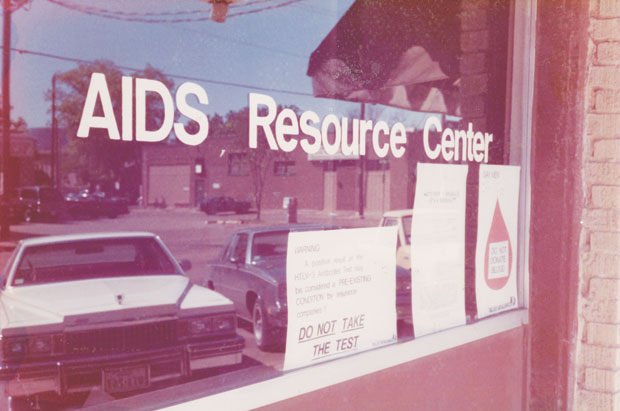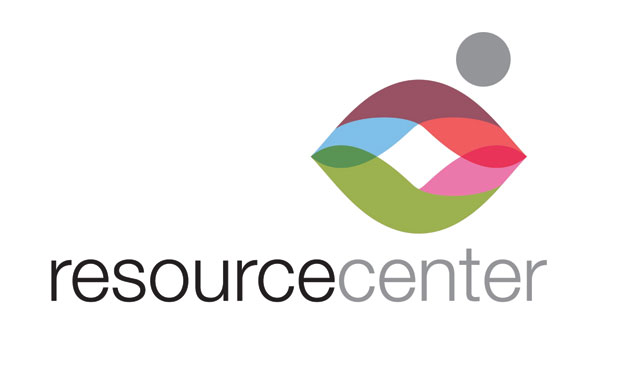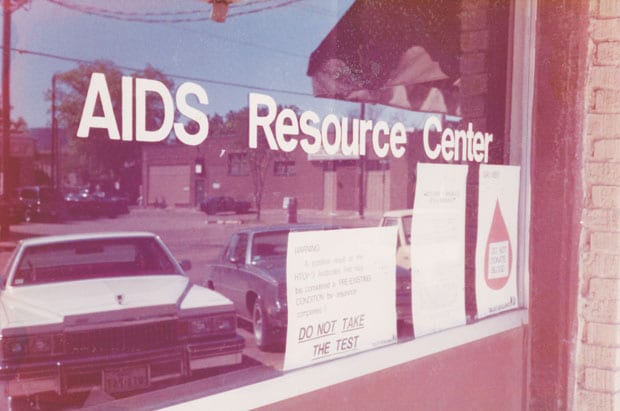New name, logo to be unveiled at anniversary events reflect expanded mission that includes Youth First, Gray Pride, family programming

The storefront of the AIDS Resource Center at its original location on Cedar Springs Road. (Resource Center Collection of LGBT History, University of North Texas Archives and Rare Books)
Three decades ago, a group of Dallas activists came together to start a community center for the LGBT community. They had no idea that a year later they’d be using the center to save lives.
The center started when the Dallas Gay Alliance, now the Dallas Gay and Lesbian Alliance, rented space on Cedar Springs in 1983. It was intended to educate and serve the community, and help achieve equality.

DALLAS AND BEYOND | As shown in its new logo, Resource Center has dropped ‘Dallas’ from its name to reflect its reach outside the city.
William Waybourn, a co-founder of the center, said that same year the DGA created the Foundation for Human Understanding as an umbrella term for the effort with a name where people could give a tax-deducible donation without the word gay being mentioned.
“It’s not like it is today,” he said. “There were a lot of people in the closet. If you had AIDS or were gay, you were likely to lose your job. There were no protections.”
But when HIV/AIDS hit North Texas a year later, the educational focus shifted to activism and outreach, leading to the AIDS Resource Center in 1985 and the Nelson-Tebedo Clinic in 1988.
“People preferred that we go away,” Waybourn said. “AIDS blew the hinges off the closet door and it changed society. Not originally but eventually.”
Waybourn said local activists tried to get the city and county to provide medical treatment to AIDS patients, but there was little government support and no clinical trials. The center’s leadership created the AIDS Financial Assistance Fund and found doctors to write prescriptions for patients and nurses to administer the medication.
“The dialogue back then was controversial,” Waybourn recalled. “We were told ‘If you stay back, we’ll take care of you’ and of course that was a joke. We wanted the same services that everyone else had.
“We had to come up with a plan, which was to deliver our own treatment, deliver our own medication and deliver our own food and funding,” he added.
The center’s humble beginnings led to a movement in Dallas that united the LGBT community, who came together to help and support their own. That support is still offered to members of the LGBT community who seek help from the center now, 30 years later.
Cece Cox, CEO of Resource Center Dallas, remembers the early days of the AIDS crisis and how the center offered life-saving support and services to patients. While the center still offers various HIV/AIDS treatments and services, its mission has expanded to cover more of the community’s needs.
Over the past year, the center examined how to grow its programs and services. Cox said youth, senior and family programs needed to expand, leading to the creation of the center’s Gray Pride program and its acquisition of Youth First Texas, now Youth First, as a program of the center. She said family programming will begin in 2014.
“We’re still here for the community, based in the community and helping the community, but the needs change,” Cox said.
Part of that change is a new rebranding effort that will be unveiled at 30th anniversary events in September, including an anniversary edition of the 5 Factor to honor five individuals with long ties to the center, an open house and a special edition of Gaybingo.
The rebranding will include a new multicolored logo for a more unified look to the center’s materials and buildings, as well as a name change to Resource Center. Cox said the rebranding is intended to help the community recognize all of the services provided by the center.
In 1998, the Foundation for Human Understanding organization was changed to Resource Center of Dallas, encompassing the center, clinic and food pantry, both of which still remain on Cedar Springs Road while the center moved to the former Metropolitan Community Church site on Reagan Street after a fire in 1989. The name later changed to Resource Center Dallas, but Cox said the new change to drop Dallas is to help emphasize the center’s reach to areas outside the city.
“The imprint that we have and demographics that we serve are beyond Dallas,” she said. “I think it’s just a more accurate representation of what we do.”
The center has been planning an expansion to a new center since it purchased a 1.75-acre site at 5714 Cedar Springs Road from Cathedral of Hope in 2008.
The new facility is expected to double the center’s current place and house the center, Nelson-Tebedo Community Clinic and the AIDS food pantry under one roof.
Last year the center hosted a demolition event to demolish the vacant strip mall on the property, which was the first major step in the center’s future home.
While leadership expected to break ground on the new center in 2014, Cox said the fundraising has only met the halfway mark of the $8.7 million capital campaign goal with $4.3 million raised. She said the center must have three-fourths of the money raised before breaking ground, which is still expected sometime in 2014.
“We hope people will want to invest in the community because of the work of the center and our 30-year history,” Cox said.
Gary Olsen, co-chair of the capital campaign, said the goal last spring during the demolition was to raise $12 million for the new facility.
Working with the architects and a consulting firm, he said the cost was lowered to $10 million and then $8.7 million by decreasing the size of the building and cutting other things to make it less expensive.
He said the plan is to still break ground sometime in 2014 and builders will allow space for possible additions to the facility in the future.
“We want to go ahead and get it built,” Olsen said.
The center will roll out the building revisions and a new vision for the capital campaign in the coming months. Olsen said with the addition of the senior and youth programs, the increased fundraising efforts will focus on where the center has come and where it’s headed in the future. Those fundraising efforts will expand to explore monetary sources outside of the LGBT community.
“We would like to have a community center,” Olsen said. “We’re focused on this concept of the community center, so we’d like the whole community to be involved, not just the LGBT community but we want any other part of the community to be a part of it, too.”
…………………
30th anniversary events
An anniversary edition of the 5 Factor on Sept. 6 will honor five people who exemplify the generosity of Dallas’ future. A community open house on Sept. 14 will celebrate the center’s anniversary in the center’s parking lot and will feature food trucks, live entertainment and more. A special edition of Gaybingo Dallas on Sept. 21 will celebrate the history of the center. For more info, visit RCDallas.org/30anniversary.
This article appeared in the Dallas Voice print edition September 6, 2013.

